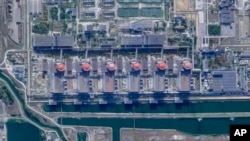Ukraine's Zaporizhzhia nuclear power plant has been disconnected from the electricity grid due to Russian shelling, according to Ukraine's state-run nuclear company.
"Today, as a result of a fire caused by shelling, the (last working) transmission line was disconnected," Energoatom said in a statement on Telegram.
Ukrainian Energy Minister German Galushchenko said on Facebook that Energoatom was not able to make repairs while fighting raged around the facility.
The International Atomic Energy Agency (IAEA) said Ukraine informed the agency that the backup power line itself, which was disconnected Monday, is not damaged. The IAEA said Ukrainian experts plan to reconnect power but that it will take several days.
The IAEA sent inspectors to the plant last week, and two experts remain at the facility. The U.N. agency is expected to issue a report on its findings on Tuesday.
Ukraine's President Volodymyr Zelenskyy said in his nightly video message Monday that the nuclear plant has again been put in a situation where it is "a step away from a radiation catastrophe."
The embattled nuclear plant has been controlled by Russia since the earliest days of its invasion but operated by Ukrainian engineers.
Both Russia and Ukraine accuse the other of shelling near the facility. Kyiv also accuses Moscow of storing ammunition around the plant and using the facility as a shield for carrying out attacks, charges Russia denies.
With the nuclear plant in a war zone, world leaders have expressed fears it could be damaged and result in a radiation disaster like that at Ukraine's Chernobyl plant in 1986.
In other developments Monday, Russia blamed Western sanctions on Moscow for its stoppages of natural gas to Europe.
Kremlin spokesman Dmitry Peskov told reporters that Western sanctions were "causing chaos" for maintenance of the Nord Stream 1 pipeline, which Russian energy giant Gazprom shut down last week after saying it detected an oil leak.
Western officials and engineers have disputed Russia's claim of mechanical problems with the pipeline. Europe accuses Russia of using its leverage over gas supplies to retaliate against European sanctions.
The energy battles between Europe and Russia led European markets to drop sharply Monday while natural gas prices surged.
Germany announced Monday that it would keep two of its three remaining nuclear power stations on standby beyond the end of the year as the country suffers a gas crunch.
German Economy Minister Robert Habeck said in a statement on Monday that the two nuclear plants would "remain available until mid-April 2023 in case needed."
He said the move does not mean that Germany is going back on its long-standing promise to exit nuclear energy and said it remains "extremely unlikely" the country would face an energy crisis in which the power stations would be needed.
Ukraine advocated Monday for "maximum support" for its efforts to defeat Russia in order to blunt economic effects on European allies.
Ukrainian Foreign Minister Dmytro Kuleba said Russia's "military aggression against Ukrainians, energy blackmail against EU citizens" were to blame for "rising prices and utility bills in EU countries."
"Solution: maximum support to Ukraine so that we defeat Putin sooner and he does not harm Europe anymore," Kuleba tweeted, referring to Russian President Vladimir Putin.
The Group of Seven nations has proposed capping the price on Russian oil exports to limit Russian profits that help fund Moscow's war efforts in Ukraine.
Russia, in turn, said it would not sell oil to any countries that implement such a cap.
Some information for this story came from The Associated Press, Agence France-Presse and Reuters.






